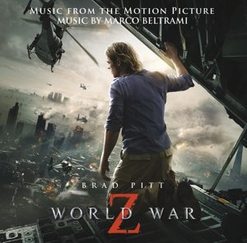
Also on board was composer Marco Beltrami, no stranger to the horror genre. Having scored such recent films as The Woman in Black and Don’t Be Afraid of the Dark (with collaborator Buck Sanders) as well as seven of Wes Craven’s films, Resident Evil, and The Thing and The Omen remakes, Beltrami consistently proves himself a reliable go-to for horror scoring. While his work in this genre has always been effective, it is outside this realm that Beltrami has received critical recognition, from Academy Award nominations for his superb work on 3:10 to Yuma and his score for Kathryn Bigelow’s 2009 Best Picture winner The Hurt Locker to his Satellite win for Soul Surfer. Taking up the mantel from Michael Kamen, Marco Beltrami also now scores the Die Hard franchise. Though a horror composer at heart, Beltrami exhibits his eclecticism and malleability through this brief career overview alone. Much like John Debney, Beltrami has a remarkable ability to mold his style to the needs of the project at hand but in this he sacrifices a distinct “Beltrami sound.” His music almost always perfectly suits or exceeds the requirements of the film, but he doesn't quite have a repertoire of memorable themes comparable to other horror greats.
World War Z is in numerous respects a prime example of this "compositional anonymity", albeit a good score regardless. Wonderfully textured and exhibiting a great blend of orchestra and electronics, Beltrami’s work here is for the most part well done action-horror. Like the film, it can be a little forgettable at times but there are still thrills to be had.
“Philadelphia” opens the album with a kind of grungy, industrial effect that calls to mind John Harrison’s Day of the Dead, and then builds with an undercurrent of ascending and descending strings to a powerful horn blast a la Hans Zimmer, matching the chaos of the Philadelphia attack sequence. The action then falls into dissonance and reemerges with the most prominent, recurring (it also appears in “Zombies in Coach, among others tracks) action cue at 3:00, based around string ostinatos and percussion. There is nothing worthy of humming here but it’s still a powerful opener that sets the tone for the rest of the action cues and establishes the orchestra/electronics combo as a propulsive force. In contrast to this is “The Lane Family,” a building, thematic cue that is warm enough to represent the focal family’s bond but preserves a distant, wailing electric guitar lest we forget what movie we’re in. The theme recurs towards the end of the album in “Wales,” a standout track that reminds of John Murphy’s 28 Days Later. “Wales” is your quintessential post-apocalyptic-hero(s)-walking-through-desolate-landscapes piece that almost all of these zombie films have but, make no mistake, this is one of the better ones.
Tracks that feature the very industrial, electronic side of the score most prominently include “Searching for Clues”, a pulsating piece with static churning and dubstep-like “wub-wub-wub” in the higher registers, and “Hand Off”, a straight atmospheric cue that will have you diving to turn down the volume when the ambient, Newman-esque tones and textures are suddenly interrupted by dissonant brutality. The same can be said for “No Teeth No Bite,” an exercise in minimalist, electronic ambience. Even with the most heavily electronic cues, the orchestra is never entirely abandoned, either lending to the dissonance or giving reprieve from it from cue to cue. In “NJ Mart,” the most heavily electronic action cue, Beltrami clouds the orchestra in grungy synthetic textures, creating a vicious blend that lends itself well to the complete anarchy onscreen.
The most memorable of Beltrami’s themes is undoubtedly that which he ascribes to humanity, the kind of “we’re beaten down but still fighting back” cue that propels through the bleakness and lends some hope to the characters’ struggle. Heard briefly at 2:03 in “Salvation Gates,” the theme receives full treatment about two thirds of the way through the standout concluding track, “Like a River Around a Rock.” Coupled with its scene (I’m attempting to avoid spoilers here), the theme’s reprise is near chill-inducing and perfectly in tune with the tone of the climax.
In addition to the material Marco Beltrami composed for the film, English rock band Muse also lent their song “The 2nd Law: Isolated System” to the film’s title sequence. Written while the band was reading Max Brooks’ novel, the song features a catchy electronic tune overlaid with British news reports of growing severity. Appropriately for World War Z, one of the newscasters prophesizes, “In an isolated system, entropy can only increase.” Muse’s song, at least according to Brad Pitt, is World War Z’s equivalent of “Tubular Bells,” Mike Oldfield’s earworm piece from The Exorcist that tends to overshadow just about every other note of music in the film. “The 2nd Law: Isolated System” probably won’t gain that level of pop-culture status, but it does the job well and provides a nice accompaniment to Marco Beltrami’s score. Sadly, the track is not included on the album, forcing you to get it off Muse’s The 2nd Law instead.
Proving once again his reliability, Marco Beltrami mostly delivers with World War Z. Though the score’s mixed bag of themes and its abrasive, industrial/ambient elements make it a sometimes challenging listening experience, what else should one expect from a zombie flick? There are moments of ingenuity (the sampling of a helicopter blade and the use of wild pig jaws for percussion), fantastically propulsive orchestral work, and even beauty here but the score’s overall anonymity bars it from ascending to a status anywhere near the other horror greats. That being said, a suite of “Philadelphia”, “The Lane Family”, “Wales”, “Like a River Around a Rock” and “The 2nd Law: Isolated System” (for good measure) would probably keep you coming back for more. Certainly another great hit by Beltrami but not exactly a home-run.
| Label: Warner Brothers Records Availability: 11 track edition | |

 RSS Feed
RSS Feed
